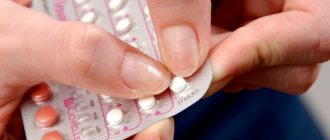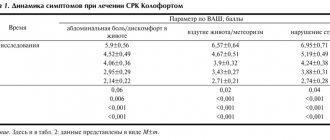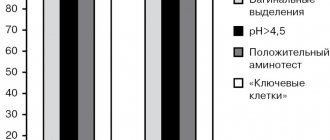Vitridinol
Description of the active components of the drug Vitridinol The scientific information provided is general and cannot be used to make a decision about the possibility of using a specific drug. Update date: 2009.03.18, Vitridinol tablet film 120 mg x56 Welfarm, ATX code: A02BX05 (Bismuth subcitrate) Active substance: bismuth tripotassium dicitrato (bismuthate, tripotassium dicitrato) BP British Pharmacopoeia
Dosage form
Vitridinol
Film-coated tabletsreg. No.: LP-002905 dated 03/12/15 - Valid Re-registration date: 11/15/17
Release form, packaging and composition
The tablets are light yellow, round, biconvex, film-coated, with the number “120” embossed on one side.
1 tab.
bismuth tripotassium dicitrate 304.6 mg,
which corresponds to the content of bismuth oxide 120 mg
Excipients: corn starch - 70.6 mg, povidone K30 - 17.7 mg, potassium polyacrylate - 23.6 mg, macrogol 6000 - 6 mg, magnesium stearate - 2 mg.
Shell composition: opadry II 85F38077 (polyvinyl alcohol, polyethylene glycol/macrogol 3350, quiniline yellow (E104), talc, titanium dioxide, indigo carmine (E132)) - 4.3 mg.
56 pcs. — polymer jars (1) — cardboard packs.
Clinical and pharmacological group: A drug that has a protective effect on the mucous membrane of the stomach and duodenum. Antiulcer drug Pharmacotherapeutic group: Antiseptic intestinal and astringent agent
Pharmacological action Antiulcer agent with bactericidal activity against Helicobacter pylori. It also has anti-inflammatory and astringent effects. In the acidic environment of the stomach, insoluble bismuth oxychloride and citrate are formed, and chelate compounds are formed with the protein substrate in the form of a protective film on the surface of ulcers and erosions. By increasing the synthesis of prostaglandin E, mucus formation and bicarbonate secretion, it stimulates the activity of cytoprotective mechanisms, increases the resistance of the gastrointestinal mucosa to the effects of pepsin, hydrochloric (hydrochloric) acid, enzymes and bile salts. Leads to the accumulation of epidermal growth factor in the defect area. Reduces the activity of pepsin and pepsinogen.
Pharmacokinetics
Bismuth tripotassium dicitrate is practically not absorbed from the gastrointestinal tract. However, small amounts of bismuth may enter the systemic circulation. It is excreted mainly in feces. A small amount of bismuth entering the plasma is excreted by the kidneys.
Indications of the drug
Peptic ulcer of the stomach and duodenum in the acute phase (including associated with Helicobacter pylori), chronic gastritis and gastroduodenitis in the acute phase (including associated with Helicobacter pylori), irritable bowel syndrome, occurring predominantly with symptoms of diarrhea, functional dyspepsia not associated with organic gastrointestinal diseases.
ICD-10 codes
Dosage regimen The method of administration and dosage regimen of a particular drug depend on its release form and other factors. The optimal dosage regimen is determined by the doctor. The compliance of the dosage form of a particular drug with the indications for use and dosage regimen should be strictly observed.
Adults and children over 4 years old - orally 2-4 times a day 30 minutes before meals. The dose depends on the patient's age.
The course of treatment is 4-8 weeks. You should not take medications containing bismuth for the next 8 weeks.
To eradicate Helicobacter pylori, it is advisable to use bismuth tripotassium dicitrate in combination with antibacterial drugs that have anti-Helicobacter activity.
Side effect
From the digestive system: transient effects are possible - nausea, vomiting, increased bowel movements, constipation.
Dermatological reactions: skin rash, itching.
From the side of the central nervous system: with long-term use in high doses - encephalopathy associated with the accumulation of bismuth in the central nervous system.
Contraindications for use
Severe renal dysfunction, pregnancy, lactation, hypersensitivity to bismuth tripotassium dicitrate.
Use during pregnancy and breastfeeding Use during pregnancy and lactation (breastfeeding) is contraindicated.
Use for impaired renal function Contraindicated in cases of severe impaired renal function.
Use in children Used in children over 4 years of age according to the dosage regimen.
special instructions
Should not be used for more than 8 weeks.
During treatment, it is not recommended to exceed the established daily doses for adults and children.
At the end of the course of treatment in recommended doses, the concentration of the active substance in the blood plasma does not exceed 3-58 μg/l, and intoxication is observed only at a concentration of more than 100 μg/l.
During use, stool may turn black due to the formation of bismuth sulfide. Sometimes there is a slight darkening of the tongue.
Drug interactions
If you take other medicines at the same time, as well as food and liquids, in particular antacids, milk, fruit and fruit juices, the effectiveness of bismuth tripotassium dicitrate may change.
Tripotassium bismuth dicitrate Vitridinol tablet film 120 mg x30
Active substance: bismuth tripotassium dicitrato (bismuthate, tripotassium dicitrato) BP British Pharmacopoeia
Dosage form
Vitridinol
Film-coated tabletsreg. No.: LP-002905 dated 03/12/15 - Valid Re-registration date: 11/15/17
Release form, packaging and composition of the drug Vitridinol
The tablets are light yellow, round, biconvex, film-coated, with the number “120” embossed on one side.
1 tab.
bismuth tripotassium dicitrate 304.6 mg,
which corresponds to the content of bismuth oxide 120 mg
Excipients: corn starch - 70.6 mg, povidone K30 - 17.7 mg, potassium polyacrylate - 23.6 mg, macrogol 6000 - 6 mg, magnesium stearate - 2 mg.
Shell composition: opadry II 85F38077 (polyvinyl alcohol, polyethylene glycol/macrogol 3350, quiniline yellow (E104), talc, titanium dioxide, indigo carmine (E132)) - 4.3 mg.
56 pcs. — polymer jars (1) — cardboard packs.
Clinical and pharmacological group: A drug that has a protective effect on the mucous membrane of the stomach and duodenum. Antiulcer drug Pharmacotherapeutic group: Antiseptic intestinal and astringent agent
Pharmacological action Antiulcer agent with bactericidal activity against Helicobacter pylori. It also has anti-inflammatory and astringent effects. In the acidic environment of the stomach, insoluble bismuth oxychloride and citrate are formed, and chelate compounds are formed with the protein substrate in the form of a protective film on the surface of ulcers and erosions. By increasing the synthesis of prostaglandin E, mucus formation and bicarbonate secretion, it stimulates the activity of cytoprotective mechanisms, increases the resistance of the gastrointestinal mucosa to the effects of pepsin, hydrochloric (hydrochloric) acid, enzymes and bile salts. Leads to the accumulation of epidermal growth factor in the defect area. Reduces the activity of pepsin and pepsinogen.
Pharmacokinetics
Bismuth tripotassium dicitrate is practically not absorbed from the gastrointestinal tract. However, small amounts of bismuth may enter the systemic circulation. It is excreted mainly in feces. A small amount of bismuth entering the plasma is excreted by the kidneys.
Indications of the active substances of the drug Vitridinol
Peptic ulcer of the stomach and duodenum in the acute phase (including associated with Helicobacter pylori), chronic gastritis and gastroduodenitis in the acute phase (including associated with Helicobacter pylori), irritable bowel syndrome, occurring predominantly with symptoms of diarrhea, functional dyspepsia not associated with organic gastrointestinal diseases.
ICD-10 codes
Dosage regimen The method of administration and dosage regimen of a particular drug depend on its release form and other factors. The optimal dosage regimen is determined by the doctor. The compliance of the dosage form of a particular drug with the indications for use and dosage regimen should be strictly observed.
Adults and children over 4 years old - orally 2-4 times a day 30 minutes before meals. The dose depends on the patient's age.
The course of treatment is 4-8 weeks. You should not take medications containing bismuth for the next 8 weeks.
To eradicate Helicobacter pylori, it is advisable to use bismuth tripotassium dicitrate in combination with antibacterial drugs that have anti-Helicobacter activity.
Side effect
From the digestive system: transient effects are possible - nausea, vomiting, increased bowel movements, constipation.
Dermatological reactions: skin rash, itching.
From the side of the central nervous system: with long-term use in high doses - encephalopathy associated with the accumulation of bismuth in the central nervous system.
Contraindications for use
Severe renal dysfunction, pregnancy, lactation, hypersensitivity to bismuth tripotassium dicitrate.
Use during pregnancy and breastfeeding Use during pregnancy and lactation (breastfeeding) is contraindicated.
Use for impaired renal function Contraindicated in cases of severe impaired renal function.
Use in children Used in children over 4 years of age according to the dosage regimen.
special instructions
Should not be used for more than 8 weeks.
During treatment, it is not recommended to exceed the established daily doses for adults and children.
At the end of the course of treatment in recommended doses, the concentration of the active substance in the blood plasma does not exceed 3-58 μg/l, and intoxication is observed only at a concentration of more than 100 μg/l.
During use, stool may turn black due to the formation of bismuth sulfide. Sometimes there is a slight darkening of the tongue.
Drug interactions
If you take other medicines at the same time, as well as food and liquids, in particular antacids, milk, fruit and fruit juices, the effectiveness of bismuth tripotassium dicitrate may change
Tripotassium bismuth dicitrate Vitridinol tablet film 120 mg x112
Description of the active components of the drug Vitridinol The scientific information provided is general and cannot be used to make a decision about the possibility of using a specific drug. Update date: 2009.03.18, Vitridinol tablet film 120 mg x112 Welfarm, ATX code: A02BX05 (Bismuth subcitrate) Active substance: bismuth tripotassium dicitrato (bismuthate, tripotassium dicitrato) BP British Pharmacopoeia
Dosage form
Vitridinol
Film-coated tabletsreg. No.: LP-002905 dated 03/12/15 - Valid Re-registration date: 11/15/17
Release form, packaging and composition
The tablets are light yellow, round, biconvex, film-coated, with the number “120” embossed on one side.
1 tab.
bismuth tripotassium dicitrate 304.6 mg,
which corresponds to the content of bismuth oxide 120 mg
Excipients: corn starch - 70.6 mg, povidone K30 - 17.7 mg, potassium polyacrylate - 23.6 mg, macrogol 6000 - 6 mg, magnesium stearate - 2 mg.
Shell composition: opadry II 85F38077 (polyvinyl alcohol, polyethylene glycol/macrogol 3350, quiniline yellow (E104), talc, titanium dioxide, indigo carmine (E132)) - 4.3 mg.
56 pcs. — polymer jars (1) — cardboard packs.
Clinical and pharmacological group: A drug that has a protective effect on the mucous membrane of the stomach and duodenum. Antiulcer drug Pharmacotherapeutic group: Antiseptic intestinal and astringent agent
Pharmacological action Antiulcer agent with bactericidal activity against Helicobacter pylori. It also has anti-inflammatory and astringent effects. In the acidic environment of the stomach, insoluble bismuth oxychloride and citrate are formed, and chelate compounds are formed with the protein substrate in the form of a protective film on the surface of ulcers and erosions. By increasing the synthesis of prostaglandin E, mucus formation and bicarbonate secretion, it stimulates the activity of cytoprotective mechanisms, increases the resistance of the gastrointestinal mucosa to the effects of pepsin, hydrochloric (hydrochloric) acid, enzymes and bile salts. Leads to the accumulation of epidermal growth factor in the defect area. Reduces the activity of pepsin and pepsinogen.
Pharmacokinetics
Bismuth tripotassium dicitrate is practically not absorbed from the gastrointestinal tract. However, small amounts of bismuth may enter the systemic circulation. It is excreted mainly in feces. A small amount of bismuth entering the plasma is excreted by the kidneys.
Indications of the drug
Peptic ulcer of the stomach and duodenum in the acute phase (including associated with Helicobacter pylori), chronic gastritis and gastroduodenitis in the acute phase (including associated with Helicobacter pylori), irritable bowel syndrome, occurring predominantly with symptoms of diarrhea, functional dyspepsia not associated with organic gastrointestinal diseases.
ICD-10 codes
Dosage regimen The method of administration and dosage regimen of a particular drug depend on its release form and other factors. The optimal dosage regimen is determined by the doctor. The compliance of the dosage form of a particular drug with the indications for use and dosage regimen should be strictly observed.
Adults and children over 4 years old - orally 2-4 times a day 30 minutes before meals. The dose depends on the patient's age.
The course of treatment is 4-8 weeks. You should not take medications containing bismuth for the next 8 weeks.
To eradicate Helicobacter pylori, it is advisable to use bismuth tripotassium dicitrate in combination with antibacterial drugs that have anti-Helicobacter activity.
Side effect
From the digestive system: transient effects are possible - nausea, vomiting, increased bowel movements, constipation.
Dermatological reactions: skin rash, itching.
From the side of the central nervous system: with long-term use in high doses - encephalopathy associated with the accumulation of bismuth in the central nervous system.
Contraindications for use
Severe renal dysfunction, pregnancy, lactation, hypersensitivity to bismuth tripotassium dicitrate.
Use during pregnancy and breastfeeding Use during pregnancy and lactation (breastfeeding) is contraindicated.
Use for impaired renal function Contraindicated in cases of severe impaired renal function.
Use in children Used in children over 4 years of age according to the dosage regimen.
special instructions
Should not be used for more than 8 weeks.
During treatment, it is not recommended to exceed the established daily doses for adults and children.
At the end of the course of treatment in recommended doses, the concentration of the active substance in the blood plasma does not exceed 3-58 μg/l, and intoxication is observed only at a concentration of more than 100 μg/l.
During use, stool may turn black due to the formation of bismuth sulfide. Sometimes there is a slight darkening of the tongue.
Drug interactions
If you take other medicines at the same time, as well as food and liquids, in particular antacids, milk, fruit and fruit juices, the effectiveness of bismuth tripotassium dicitrate may change.
Tripotassium bismuth dicitrate Vitridinol tablet film 120 mg x56
Description of the active components of the drug Vitridinol The scientific information provided is general and cannot be used to make a decision about the possibility of using a specific drug. Update date: 2009.03.18, Vitridinol tablet film 120 mg x56 Welfarm, ATX code: A02BX05 (Bismuth subcitrate) Active substance: bismuth tripotassium dicitrato (bismuthate, tripotassium dicitrato) BP British Pharmacopoeia
Dosage form
Vitridinol
Film-coated tabletsreg. No.: LP-002905 dated 03/12/15 - Valid Re-registration date: 11/15/17
Release form, packaging and composition
The tablets are light yellow, round, biconvex, film-coated, with the number “120” embossed on one side.
1 tab.
bismuth tripotassium dicitrate 304.6 mg,
which corresponds to the content of bismuth oxide 120 mg
Excipients: corn starch - 70.6 mg, povidone K30 - 17.7 mg, potassium polyacrylate - 23.6 mg, macrogol 6000 - 6 mg, magnesium stearate - 2 mg.
Shell composition: opadry II 85F38077 (polyvinyl alcohol, polyethylene glycol/macrogol 3350, quiniline yellow (E104), talc, titanium dioxide, indigo carmine (E132)) - 4.3 mg.
56 pcs. — polymer jars (1) — cardboard packs.
Clinical and pharmacological group: A drug that has a protective effect on the mucous membrane of the stomach and duodenum. Antiulcer drug Pharmacotherapeutic group: Antiseptic intestinal and astringent agent
Pharmacological action Antiulcer agent with bactericidal activity against Helicobacter pylori. It also has anti-inflammatory and astringent effects. In the acidic environment of the stomach, insoluble bismuth oxychloride and citrate are formed, and chelate compounds are formed with the protein substrate in the form of a protective film on the surface of ulcers and erosions. By increasing the synthesis of prostaglandin E, mucus formation and bicarbonate secretion, it stimulates the activity of cytoprotective mechanisms, increases the resistance of the gastrointestinal mucosa to the effects of pepsin, hydrochloric (hydrochloric) acid, enzymes and bile salts. Leads to the accumulation of epidermal growth factor in the defect area. Reduces the activity of pepsin and pepsinogen.
Pharmacokinetics
Bismuth tripotassium dicitrate is practically not absorbed from the gastrointestinal tract. However, small amounts of bismuth may enter the systemic circulation. It is excreted mainly in feces. A small amount of bismuth entering the plasma is excreted by the kidneys.
Indications of the drug
Peptic ulcer of the stomach and duodenum in the acute phase (including associated with Helicobacter pylori), chronic gastritis and gastroduodenitis in the acute phase (including associated with Helicobacter pylori), irritable bowel syndrome, occurring predominantly with symptoms of diarrhea, functional dyspepsia not associated with organic gastrointestinal diseases.
ICD-10 codes
Dosage regimen The method of administration and dosage regimen of a particular drug depend on its release form and other factors. The optimal dosage regimen is determined by the doctor. The compliance of the dosage form of a particular drug with the indications for use and dosage regimen should be strictly observed.
Adults and children over 4 years old - orally 2-4 times a day 30 minutes before meals. The dose depends on the patient's age.
The course of treatment is 4-8 weeks. You should not take medications containing bismuth for the next 8 weeks.
To eradicate Helicobacter pylori, it is advisable to use bismuth tripotassium dicitrate in combination with antibacterial drugs that have anti-Helicobacter activity.
Side effect
From the digestive system: transient effects are possible - nausea, vomiting, increased bowel movements, constipation.
Dermatological reactions: skin rash, itching.
From the side of the central nervous system: with long-term use in high doses - encephalopathy associated with the accumulation of bismuth in the central nervous system.
Contraindications for use
Severe renal dysfunction, pregnancy, lactation, hypersensitivity to bismuth tripotassium dicitrate.
Use during pregnancy and breastfeeding Use during pregnancy and lactation (breastfeeding) is contraindicated.
Use for impaired renal function Contraindicated in cases of severe impaired renal function.
Use in children Used in children over 4 years of age according to the dosage regimen.
special instructions
Should not be used for more than 8 weeks.
During treatment, it is not recommended to exceed the established daily doses for adults and children.
At the end of the course of treatment in recommended doses, the concentration of the active substance in the blood plasma does not exceed 3-58 μg/l, and intoxication is observed only at a concentration of more than 100 μg/l.
During use, stool may turn black due to the formation of bismuth sulfide. Sometimes there is a slight darkening of the tongue.
Drug interactions
If you take other medicines at the same time, as well as food and liquids, in particular antacids, milk, fruit and fruit juices, the effectiveness of bismuth tripotassium dicitrate may change.



